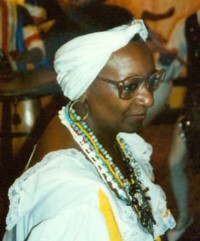Afro-Uruguayan in Uruguay

Photo Source:
Galen Frysinger
|
Send Joshua Project a map of this people group.
|
| People Name: | Afro-Uruguayan |
| Country: | Uruguay |
| 10/40 Window: | No |
| Population: | 67,000 |
| World Population: | 69,400 |
| Primary Language: | Spanish |
| Primary Religion: | Christianity |
| Christian Adherents: | 91.00 % |
| Evangelicals: | 6.00 % |
| Scripture: | Complete Bible |
| Ministry Resources: | Yes |
| Jesus Film: | Yes |
| Audio Recordings: | Yes |
| People Cluster: | Afro-American, Hispanic |
| Affinity Bloc: | Latin-Caribbean Americans |
| Progress Level: |
|
Introduction / History
Afri-Uruguayans, also known as Afro-Uruguayans, are descendants of enslaved Africans brought to Uruguay during the Spanish colonial period, beginning in the 1500s. Many arrived through the port of Buenos Aires and were later transported to Montevideo, where some 20,000 Africans settled by the early 1800s. These communities formed salas de nación, mutual aid societies based on African origins, which preserved cultural and religious practices and supported emancipation efforts.
The Afro-Uruguayan population makes up about 4.6% to 10% of Uruguay's population. Their language is Rioplatense Spanish, with some influence from Portuñol in border regions. Afro-Uruguayans have played a significant role in Uruguay's military history, independence movements, and cultural development, especially through music and dance traditions like Candombe.
What Are Their Lives Like?
Afri-Uruguayans are concentrated in Montevideo, particularly in Barrio Sur and Palermo. Many work in construction, domestic service, and cleaning industries, and face high unemployment rates, especially among youth. Despite their contributions to national culture, they remain among the poorest sectors of society.
Cultural life is vibrant, with Candombe drumming, Murga theater, and Carnival performances serving as expressions of identity and resistance. Community organizations such as Mundo Afro and Uruguay Negro advocate for civil rights, education, and economic inclusion.
What Are Their Beliefs?
The vast majority of Afri-Uruguayans identify as Christian, primarily Roman Catholic, though some are Evangelical. A minority practice ethnic religions such as Umbanda and Afro-Brazilian possession cults. Religious syncretism is common, blending Catholic saints, African deities, and spiritual rituals. Umbanda and other Afro-religions have grown in popularity, especially in low-income communities, offering spiritual comfort and communal support.
What Are Their Needs?
Access to quality education is essential to reduce dropout rates and improve long-term opportunities. Economic empowerment through vocational training, entrepreneurship, and affirmative action policies is vital to address poverty and unemployment. Inclusion in healthcare systems is necessary to improve physical and mental well-being. Support for cultural preservation helps maintain identity and pride in Afro-Uruguayan heritage. Resources for discipleship and biblical teaching are needed to deepen spiritual understanding and encourage gospel-centered living. Advocacy for racial equity and political representation is crucial to challenge systemic discrimination and promote justice.
Prayer Points
Pray for a movement of spiritual renewal among Afri-Uruguayan Christians, that their faith may grow deeper and more vibrant.
Ask God to raise up local leaders and pastors who can disciple others with wisdom and cultural sensitivity, leading them to become Christ's ambassadors in Uruguay.
Intercede for the younger generation, that they may remain rooted in Christ and become agents of transformation in society.
Pray for unity among believers, and for the church to be a beacon of hope and reconciliation in Uruguay.